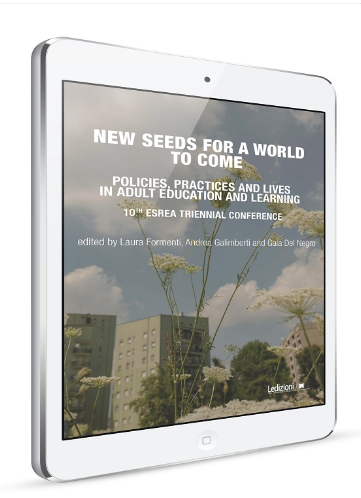NEW PUBLICATION: RegALE at the ESREA Conference on “New seeds for a world to come. Policies, practices and lives in adult education and learning”

10th ESREA Triennial Conference University of Milano Bicocca, Department of Human Sciences for Education
29 September - 1 October 2022
The ESREA community celebrated 30 years of ESREA. The 10th Triennial conference New seeds for a world to come was a great opportunity to gather together, look back with satisfaction, look forward with hope, and enhance a sense of belonging to this community.
In the conference call, they mentioned the “dramatic changes” that were (and are) going on in individual and collective lives, bringing unexpected revisions of common educational and cultural practices, and compelling everyone to deal with the experience of the pandemic, and its consequences. However, they also stated our desire to make the Conference “a positive reflexive moment to look at the future, to mobilize the best energies of adult education research and intervention, and interrogate the controversial, nonlinear effects of the ongoing ecological, economic, and social changes”.
RegALE contribution
The RegALE consortium presented an article titled Survey on Adult Learning and Education Policies and Practices. Opinions of European Regional and Local Stakeholders and can be found on page 107 of the publication.
Abstract
The opinions European local and regional stakeholders have about the actual situation and the future perspectives of adult learning and education is the object of the international survey herein reported. The goal of the RegALE survey (Regional capacity for adult learning and education) was to get a multilayered view on the challenges and opportunities of the adult education sector at the regional and local level, and gaps and needs of the adult education and learning staff. Using the Delphi method technique, a questionnaire was structured for adult learning policies assessment, drawing on a study by the European Commission (2015), to assess the basic factors influencing the participation in adult education and learning, and staff’s capability to deliver an adequate skills supply both for individuals (equity) and for society (sustainability), at this time (pandemic and Next generation Europe’ implementation). RegALE survey was primarily addressed to public and private experts and stakeholders from 12 European countries. 241 professionals took part remotely, being: 67 politicians and professionals involved in adult education and learning governance at a regional and local level (28%), and 174 professionals responsible for leading, managing and coordinating adult education organizations (AEOs) (72%). Data analysis and interpretation indicated six success factors of the European framework related to five domains: i) Policies, systems, investments, organizations. ii) Adult learning supply, demand and workforce. iii) Disadvantaged groups. iv) Vertical and horizontal governance. v) Internationalization of adult learning organizations. These might have an impact on the development of European cities and regions, as well as on the provision of an adequate adult learning supply, as long as they are accompanied by networks and cooperation of stakeholders on a local level, enabling individual and community growth.
KEYWORDS: learning exclusion equilibrium, governance in adult learning and education, clusters

commander kamagra en ligne sans ordonnance
livraison samedi kamagra livraison